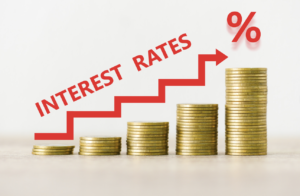
Some market analysts had initially predicted a rise of 0.5%, however, news that the economy shrank by 0.3% in April meant that a 0.25% rise was far more likely. Markets continue to speculate how high interest rates will go, with some predicting they could reach as high as 2.5% by the end of 2022.
Why have interest rates increased?
The Government sets the Bank of England an inflation target of 2%. The Consumer Price Index (CPI) is an index that is used to track inflation and it tracks the price of a range of day-to-day goods and services. The rise in energy prices, consumer demand in the wake of the pandemic and continued political unrest have meant that prices are going up at the fastest rate since the 1980s, pushing inflation as high as 9%. The Bank of England can raise interest rates as a way of slowing inflation as it discourages borrowing and ultimately encourages people to save. The Bank of England has to find a balance, however, because if it raises rates too slowly then it will be accused of not doing enough to tackle inflation. Conversely, if it raises rates too quickly, then it risks tipping the economy into a recession.
Check out our article "When will interest rates rise (or in fact be cut)?" and watch Damien's latest video to learn more about why interest rates are on the rise and what is likely to happen in the coming months.
History of interest rate rises 2021-2022
There are a group of nine members who make up the Monetary Policy Committee (MPC). Their job is to vote to determine the latest interest rates. The group meets every 6 weeks and each member is responsible for casting a vote, the results of which are published along with the minutes at the conclusion of the meeting.
We have summarised the latest Bank of England rate rises below, including the date they were announced.
| Date | Interest rate rise | Previous interest rate | New interest rate | Increase to average monthly mortgage repayments per £100k borrowed* |
| 16th December 2021 | +0.15% | 0.10% | 0.25% | £8 |
| 2nd February 2022 | +0.25% | 0.25% | 0.50% | £13 |
| 17th March 2022 | +0.25% | 0.50% | 0.75% | £13 |
| 5th May 2022 | +0.25% | 0.75% | 1.00% | £13 |
| 16th June 2022 | +0.25% | 1.00% | 1.25% | £13 |
| TOTAL | £60 |
*assumed mortgage term is 25 years
How will the latest rise in interest rates impact you?
A rise in interest rates will impact both borrowers and savers and so we summarise the likely impact on both below.
Impact of rising interest rates on borrowing
Mortgages
Those on a fixed-rate mortgage deal will not see an increase in their monthly repayments.
Those on a tracker or variable-rate mortgage are likely to see their monthly payments go up, however, it will be down to the lender as to how long this will take.
A good way to work out how much the interest rate rise will cost you is to use our interest rate rise calculator. To keep things simple, monthly repayments on a 25-year mortgage will rise by £12-£13 for every £100,000 you owe.
Those worried about interest rate rises should speak to an independent mortgage broker as they will be able to explain how much it will cost and the best way to remortgage. It is important to check your paperwork to see if there are any Early Repayment Charges (EPC) and it is wise to check how long is left on your current deal.
Habito* is an independent online specialist that offers whole-of-market advice. Additionally, our mortgage best buy calculator. can help you find the cheapest mortgage deals.
Loans
An interest rate rise should not impact your existing loan as most personal loans are agreed based on a fixed rate of interest. The cost of new personal loans are likely to rise in response to the latest interest rate rise and so those in the process of applying for a new personal loan should act quickly.
Credit Cards
Overdrafts
It is possible that the interest rate you pay on your overdraft will go up in response to the latest rate rise, however, you will always be provided with plenty of notice.
What is the impact of rising interest rates for savers?
An increase in the Bank of England base rate should have a positive impact on savings rates but improved savings rates often take time to filter into the market. Ultimately, it is up to the individual product provider as to whether they pass on the increase or not. However, the current top 6 easy access accounts pay an interest rate that is almost 0.6% higher than six months ago following the series of Bank of England base rate hikes.
To view the most competitive savings rates, check out our regularly updated savings best buy tables.
If a link has an * beside it this means that it is an affiliated link. If you go via the link Money to the Masses may receive a small fee which helps keep Money to the Masses free to use. But as you can clearly see this has in no way influenced this independent and balanced review of the product. The following link can be used if you do not wish to help Money to the Masses - Habito